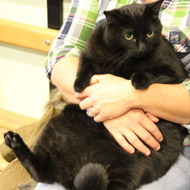
PDSA tells the stories of early entrants to its Pet Fit Club
Pet obesity looks set to soar within the next five years, yet alarmingly, nearly 50 per cent of owners are not aware it's a major issue. This is the warning issued by the PDSA today as it launches its Pet Fit Club.
Early entrants to the fat-fighting competition include a cocker spaniel called Millie, who weighs in at a staggering 33.5kg - twice her ideal weight.
Health problems make it difficult for owner Jacqueline Maguire, 75, from Romford, to walk Millie as often as she would like due to health problems. On top of that, the colossal cocker spaniel is an expert beggar, bringing out the puppy dog eyes at every sniff of food.
“I do give in to her begging far too often," admits Jacqueline. "I have four rescue cats and when I feed them she’s hovering around and grabs any food she can.”
Rescue cat Boycus has also been placed under a strict weight loss regime after his owners turned to the PDSA for help. At 10kg, he is more than double the size of an average cat.
Boycus lives in a multicat household, but all of his feline family are a healthy weight. While his owner Sam, from Sutton Coldfield, says she tries to restrict his access to food, he has a habit of eating anything in sight and as a result his weight has ballooned over the past couple of years.
"We’ve tried everything," says Sam. "We’ve built feeding stations, with cat carriers that are too small for him to try and stop him stealing our other cats’ food. But he always finds a way to break in.”
PDSA's fit club helps a range of animals, as well as cats and dogs, and this year a giant rat called Spider has joined the contest. Spider weighs 900g, nearly double the size of an average rat, and he can no longer cling to the top of his cage and gets stuck in his igloo.
According to his owners, Spider has a bloodhound's ability to sniff out food stored by his siblings.
PDSA's most recent animal wellbeing report indicates that four in five veterinary professionals surveyed have seen an increase in pet obesity in the past two years. In fact, 80 per cent of vets and nurses believe obese pets will outnumber healthy pets in five years.
Owners can enter their pet for the competition at www.petfitclub.org.uk. The deadline for entries in Sunday, 26 April.
Image (C) PDSA



 The Animal and Plant Health Agency (APHA) has updated its online reporting service for dead wild birds.
The Animal and Plant Health Agency (APHA) has updated its online reporting service for dead wild birds.